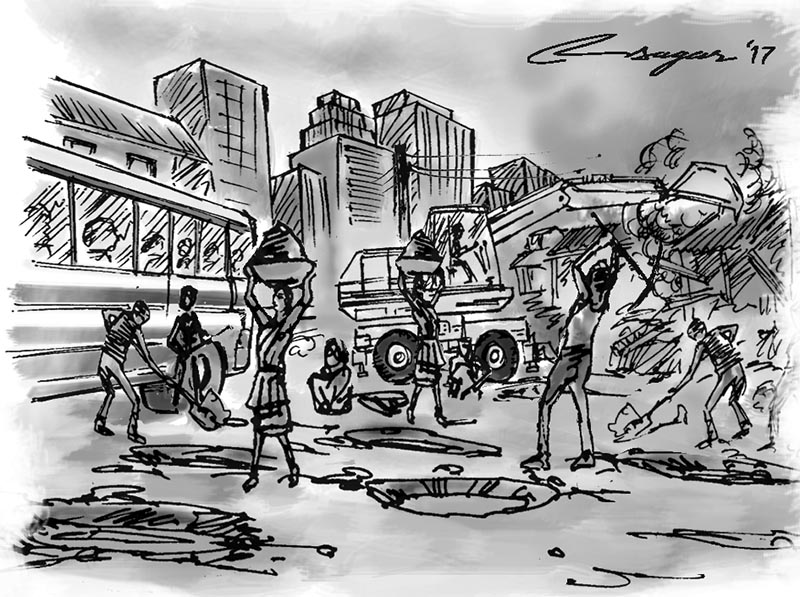Governance and delivery: In a sick condition
Without deep-rooted reforms following the overhauling approach grounded on guaranteed accountable and transparent system at different levels, including local levels, a breakthrough in the governance system is impossible
Recognizing that overhauling of governance and public service delivery system is the prerequisite for economic prosperity and well being of the common people in a short span of time, many reforms and changes in the related areas were provisioned in the new constitution. Indeed, it was hoped that after its promulgation, a new era would begin from these critical aspects. Ironically, however, both symptoms and trends in many related areas are opposite to the commitments made through the constitution and other means. Some examples verify this.
Very recently there were media reports that earthquake victims from remote and inaccessible areas were compelled to spend almost 40 to 50 percent of the first installment of Rs. 50 thousand while collecting money from the district headquarters as they had to walk six to eight days and stay overnight in different places. This is a state of misery of the earthquake victims after more than two years of suffering.
Despite ongoing investigation into the abuse of authority by the chief and members of the tax settlement commission exposing the extent of institutionalized corruption in the tax system, there are attempts to narrow down or limit the investigation. There is also a constant flow of information that the practice of patronage and client based system has now further heightened in which a broker type system is institutionalized and strengthened by means of a closer nexus with influential power centers and governing elites. In such a system, some deals are fixed in a priority with license, service or contract seekers in which a huge commission is charged against the stipulated task which under normal processes is turned down deliberately by the concerned authorities. There are complaints that such a rent seeking system has been further encouraged in almost all public service providing entities. There are also reports of new attempts on retaining more discretionary powers by the higher authorities in service providing a phased-wise contract awarding institutions with likely more pervasive adverse effects on rent-seeking practices amidst a tendency of authorities employing new tactics of escaping from the purview of Commission for the Investigation of Abuse of Authority.
In the changed political milieu also, in the absence of drastic measures or inducement through policies, a parallel economy is thriving with a detrimental impact on the country’s development endeavors. Based on the recent Doing Business Surveys of the World Bank and many others, it is implicit that the system of, among others, contract enforcement and tax payments is continuously inducing parallel economy to a greater extent. Continued inducement to the black economy is evident further from the recent Global Financial Integrity report as it indicates that Nepal is one the top exporters of illicit financial flows among the least developed countries. No initiatives whatsoever taken in this area raise many questions.
Perhaps a more striking example from the standpoint of governance and delivery including their minimum norms and ethics is the condition of the capital city Kathmandu today. The ongoing anarchistic or isolated construction or destructive works carried by various entities like road, water supply, drainage and electricity supply, of course and predominated by the road have created a nightmare in the capital, a city so far famous in terms of its heritage, archaeology and culture.
In parallel, the state of affairs in the budgetary management system further exemplifies how a budgetary rule and financial discipline based system essential for efficiency in resource use and effectiveness in budgetary implementation has been thrown away or destroyed. Out of the total capital expenditure budgeted for the last fiscal year 2016/17 only 65.5 percent was spent. More worrying was that most such expenses were made in one and half months by spending almost Rs 5 billion every day at a time when the fiscal year was approaching the end. This, in addition to being a climax of resource misuse and financial anarchism, reveals wide-ranging likely adverse implications, including increased recurring expenses liability in the future in a situation where rise in such expenses at the cost of capital expenditure has been a challenge.
This also leads to compromises on quality and hence contributes to the re-escalating of supply side constraints and other bottlenecks in the near future and hinders the path to sustained higher growth. More fundamentally, such a practice undermines planning in general and budgetary system in particular. It also raises questions on the rationality of paying taxes by the people.
These few examples demonstrate that the system of checks and balances claimed to be the virtue of democracy has hardly worked in the changed milieu as well. A captured system is strongly driven by prolonging the grip in the state system and extracting rents. As an offshoot, crony capitalism has thrived markedly. Therefore, without deep rooted reforms following the overhauling approach grounded on guaranteed accountable and transparent system at different levels, including local levels, a breakthrough in the governance system is impossible. However, under the business as usual scenario, this is most unlikely.






